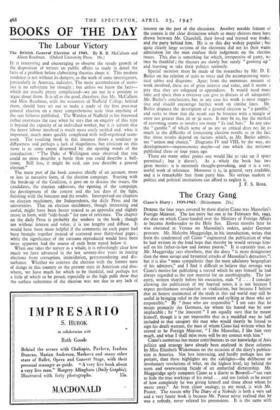BOOKS OF THE DAY
The Labour Victory
The British General Election of 1945. By R. B. McCallum and Alison Readman. (Oxford University Press. 18s.)
IT is interesting and encouraging to observe the steady growth of the disposition of writers on public affairs to study in detail the facts of a problem before elaborating theories about it. This modern tendency is not without its dangers, as the work of some investigators, particularly in America, indicates. The mere accumulation of statis- tics is no substitute for thought ; but unless we know the facts— which are usually pretty complicated—we are not in a position to argue about them. It is all to the good, therefore, that Mr. McCallum and Miss Readman, with the resources of Nuffield College behind them, should have set out to make a study of the first post-war general election on a more comprehensive scale than anything of the sort hitherto published. The Warden of Nuffield in his foreword rather overstates the case when he says that an enquiry of this type is beyond the capacity of an individual,- worker, but it is certain that the heavy labour involved is much more easily tackled and, what is important, much more quickly completed with well-organised team- work. The resulting book in this instance shows a tendency to diffuseness and perhaps a lack of shapeliness, but criticism on this score is to some extent disarmed by the opening words of the introduction: " The Duke of Wellington once observed that you could no more describe a battle than you could describe a ball- room. Still less, it might be said, can you describe a general election."
The main part of the book consists chiefly of an account, more or less in narrative form, of the election campaign. Starting with the break-up of the Coalition, it goes on to discuss the issues, the candidates, the election addresses, the opening of the campaign, the development of the contest and the last days of the fight, finishing with the forecasts and the results. Interspersed are chapters on election machinery, the Independents, the daily Press and the universities. That on election machinery, though interesting and useful, might have been better treated as an appendix and slightly recast in form, with "side-heads " for ease of reference. The chapter on the daily Press is probably the weakest in the book; though not without interest and value, it is too lengthy and diffuse. It would have been more helpful if the comments on each paper had been brought together instead of scattered over thirty-four pages ; while the significance of the cartoons reproduced would have been more apparent had the source of each been stated below it. When one takes the survey as a whole, it is refreshingly clear how much we have advanced in the last seventy-five years in freeing elections from corruption, intimidation, gerrymandering and dis- turbance. Whether we contrast the election with the former state of things in this country or the present state in American and else- where, we have much for which to be thankful, and perhaps not a little of which to be proud, especially as the high polls show that the surface sedateness of the election was not due to any lack of
interest on the part of the electorate. Another notable feature of the contest is the clear distinction which so many electors must have
drawn between Mr. Churchill, their loved and trusted war leader,
and the party behind him. He is to this day widely popular ; but quite clearly large sections of the electorate did not let their warm
admiration for the man confuse their judgement on the election issues. This also is something for which, irrespective of party, we may be thankful ; the electors are slowly but surely " growing up " and learning to take their politics seriously.
Special mention must be made of the researches by Mr. D. E. Butler on the relation of seats to votes and the accompanying statis- tical tables and diagrams. Apart from the enormous amount of work involved, these are of great interest and value, and it seems a pity that they are relegated to appendices. It would need more
time and space than a reviewer can give to discuss at all adequately Mr. Butler's conclusions, but in any case his work is most sugges- tive and should encourage further work on similar lines. Mr.
Butler disputes the description of a general election as " a gamble," and seeks to show that the result can be forecast with a margin of error not greater than 20 or 3o seats. It may be so, but the method of reasoning seems to involve too many " ifs and buts." In any case the " gamble " of wh:ch some of us are so critical does not lie so
much in the difficulty of forecasting election results as in the fact that those results depend on factors which, as Mr. Butler admits, are " unjust and chancy." Diagrams IV and VIII, by the way, are developments—improvements maybe—of one which the reviewer published three or four years ago.
There are many other points one would like to lake up if space permitted ; but it doesn't. As a whole the book has two great merits : it is extremely thought-provoking, and it is a very useful work of reference. Moreover it is, in general, very readable, and it is remarkably free from party bias. No serious student of politics and political institutions can afford to neglect
J. F. S. Ross.


































 Previous page
Previous page